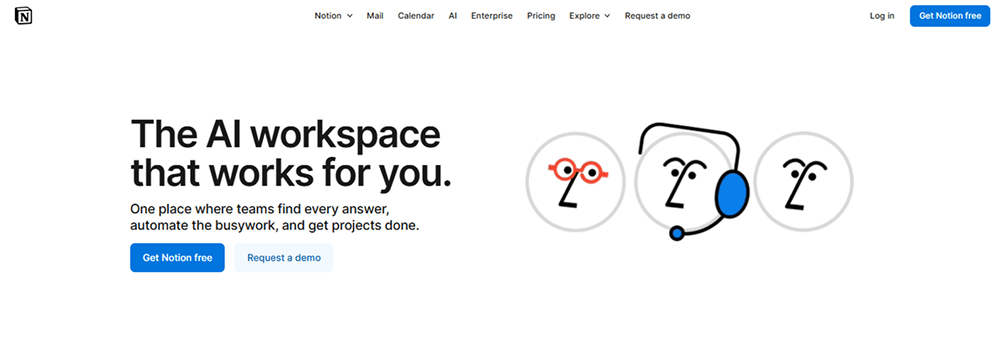Notion (Ops Manuals) Overview & 2026 Industry Position
In 2026, Notion (Ops Manuals) positions itself as a vital tool for teams looking to scale operational clarity through structured, living documentation. Built on top of Notion’s flexible workspace infrastructure, this specialized solution converts tribal knowledge into shareable execution guides. While traditional SOP software focuses on static playbooks, Notion (Ops Manuals) takes a modular approach—allowing teams to embed contextual workflows, real-time owner fields, and easily updatable policies directly within their everyday workspace. With an industry-wide push toward AI-assisted ops, this platform is designed to help organizations centralize their know-how, rapidly onboard talent, and drive cross-functional accountability like never before.
From Launch to 2026: Notion (Ops Manuals)’s Journey
Notion (Ops Manuals) began as an internal template library in late 2021, evolved into a public template toolkit by mid-2022, and formalized as a standalone system in 2023. By 2024, it expanded into a robust package of frameworks for scaling org documentation. Pivotal updates included:
- 2021 (Q4) – Internal playbooks introduced within engineering teams
- 2022 (Q2) – Community-released SOP templates hit 10,000+ downloads
- 2023 (Q1) – Full release of Notion (Ops Manuals) workspace kit with standardized roles, functions, and audits
- 2024 (Q3) – AI documentation assistant integrated for dynamic upkeep
- 2025 (Q1) – Modular permissions and workflow-wide search overhaul
2026 Strategy Thesis: The platform aims to be the gold standard for living documentation—turning your teams’ day-to-day habits into sustainable, scalable SOPs.

Notion (Ops Manuals) Key Features
The core utility lies in operationalizing standard operating procedures—without the brittleness of traditional PDF handbooks or static docs. Key features include:
- Pre-built SOP Templates – Finance, HR, Product, IT, Customer Success, and more
- Role Ownership Fields – Each step auto-assigns responsibility with cross-referencing
- Operational Health Dashboard – Tracks updated docs, gaps, and review cycles
- AI Assistant Integration – Helps draft, format, and revise playbooks from meeting notes or Slack threads
- Team-based Permissions – Flexible visibility rules for leadership, departments, and auditors
Workflow & UX
Unlike clunky knowledge management tools of the past, Notion (Ops Manuals) feels familiar yet specialized. Built entirely within Notion’s ecosystem, users benefit from:
- Inline checklists and columns without needing external plugins
- Workspace hierarchy aligned to functional units: Department → Role → Outcome
- Global search across SOP titles, owners, and stakeholders
- Self-guided onboarding embedded in each function’s landing page
Navigation is both customizable and consistent, enabling junior hires and senior leads alike to reference and edit with confidence.
Notion (Ops Manuals) Pricing Analysis & Value Metrics
As of July 2026, pricing is remarkably transparent, especially for a product built on a freemium core infrastructure:
| Plan | Monthly Price | Includes |
|---|---|---|
| Starter | Free | 20 SOPs, basic templates, manual updates |
| Team | $8/user | Unlimited SOPs, permissions, dashboard metrics |
| Ops Pro | $15/user | AI assistant, audit logs, role tracking |
| Enterprise | Custom | Cross-team visibility rules, SSO/SAML, concierge onboarding |
Value Insight: Most startups gain full ROI from the Team plan alone; bigger orgs will rapidly justify Ops Pro through saved onboarding time and compliance clarity.
Competitive Landscape
While SOP builders abound, few provide the ease and editability that come with native Notion infrastructure. Here’s how Notion (Ops Manuals) compares:
| Tool | Strength | Drawback |
|---|---|---|
| Tango | Auto-screen capture flows | Minimal scalability to full org SOPs |
| Trainual | Dedicated onboarding modules | Not fully integrated into daily workflows |
| Guru | Knowledge search + AI | Lacks native operations templates |
| Notion (Ops Manuals) | Best-in-class flexibility & embed power | Requires a Notion-native team |
Use Cases
The platform is highly adaptable across industries. Top use cases include:
- Startups & Scaleups – Codify key processes fast as hiring ramps
- People & Culture Teams – Structure onboarding, policies, and offboarding checklists
- Customer Operations – Document support flows and escalation ladders
- E-commerce Brands – Track logistics playbooks, supplier comms, and seasonal plans
Integrations & Ecosystem Benefits
Notion (Ops Manuals) plays natively in the Notion stack. Beyond that:
- Connect to Slack for SOP feedback loops
- Connect to Zapier / Make for documentation triggers
- Embed Loom, Figma, Miro, and Airtable views
- AI sync brings in calendar notes and summary insights from Zoom or Gmeet calls
Pros & Cons
- Pro: Native Notion experience—zero learning curve for existing users
- Pro: Highly customizable with AI-driven SOP suggestions
- Pro: One-time setup pays lifelong dividends across hiring and audits
- Con: Less value if your team doesn’t actively use Notion
- Con: Permissions setup can be nuanced for mixed external users
Final Thoughts
If your team seeks a smarter way to scale repeatable excellence, Notion (Ops Manuals) is a compelling choice. Smaller teams get the benefit of expertly organized SOPs; larger orgs appreciate the compliance-ready structure. Team buy-in is swift where Notion is already in use. For others, investing time in adoption up front will yield significant dividends across onboarding speed, error reduction, and organizational memory.
Pro Tip: Assign a playbook owner for each department before going live—it sharpens roles and accelerates initial adoption.
Notion (Ops Manuals) FAQ
Yes, the Starter tier works on Notion’s free plan, supporting up to 20 SOP pages and basic organization.
Yes. Pro and Enterprise tiers include AI Assistants to help write, revise, and suggest updates to SOPs based on activity or notes.
Absolutely. Team and Enterprise plans allow granular permissions by role, department, or function.
Notion is a general workspace; Notion (Ops Manuals) is a carefully built structure layered on top to systematize operations.
They support both. You can link SOPs across departments and still assign single owners to maintain integrity.

